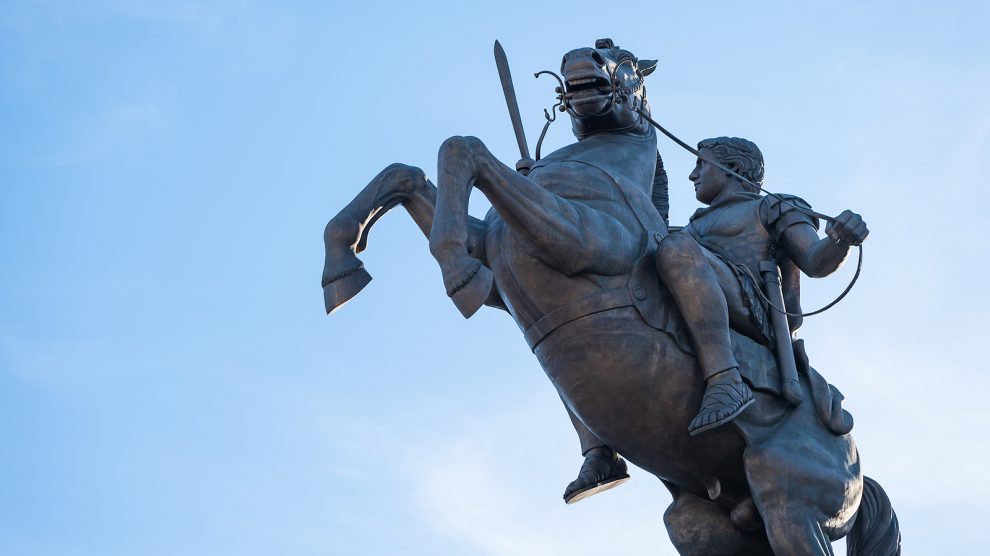The withdrawal of an ethnic Albanian party from the government of North Macedonia might finally allow the country to recognise a Bulgarian minority in its constitution, allowing Skopje to move past its dispute with Sofia and clearing the path for both it and Albania to begin the long march towards EU membership.
North Macedonia’s road to joining international institutions has long been rocky, owing to disputes with its neighbours over its language and name.
Once the ‘Republic of Macedonia’—or the former Yugoslav Republic of Macedonia (FYROM) to international organisations—Greece opposed its accession to the North Atlantic Treaty Organisation (NATO) and European Union unless it added the geographic qualifier ‘North’ to its name.
Greece is home to an adjacent region called ‘Macedonia’ and a population of ethnic Greeks who also identify as ‘Macedonians’. It was only after decades of United Nations mediation that the two countries agreed to end their dispute in the 2018 Prespa deal. FYROM became ‘North Macedonia’, and in turn Greece allowed it to become the 30th member of NATO in early 2020 and begin the process of EU membership.
- New report warns of Russia’s ‘opaque’ Balkan network
- Adopting green policies can reduce risks to North Macedonia’s agriculture sector
- Western Balkans show resilience despite slowing growth and continued price rises
North Macedonia has been an official candidate for EU accession since 2005, but just when it seemed it had cleared its last hurdle to begin accession negotiations, the Bulgarian government issued a long list of demands to Skopje.
“Bulgaria will not allow the EU integration of the Republic of North Macedonia to be accompanied by European legitimisation of an anti-Bulgarian ideology,” read the demands.
In late 2020, Bulgaria circulated a document to other EU member states explaining its refusal to advance North Macedonia’s accession, stating it cannot “accept that the still ongoing nation-building process in the Republic of North Macedonia be conducted through the revision of our common history, the denial of our common ethnic and linguistic roots or the unfounded claims for the existence of a ‘Macedonian minority’ in Bulgaria.”
After rounds of bilateral negotiations, a joint commission on historical and educational issues, and EU mediation failed, France proposed a compromise in June 2022: Bulgaria would unblock North Macedonia’s EU accession if North Macedonia’s constitution were amended to recognise and protect the rights of an ethnic Bulgarian minority.
Both Skopje and Sofia agreed to the deal, but it lacked the parliamentary support needed to actually amend the Macedonian constitution—until this week.
The dispute with Bulgaria
Many Bulgarian nationalists view North Macedonia as ‘Western Bulgaria’—a part of Bulgaria similar to how Serbian nationalists claim Kosovo and Hungarian nationalists claim Transylvania. To bolster this position, they point to the high degree of mutual intelligibility between the Macedonian and Bulgarian languages.
In fact, Macedonian is also mutually intelligible with varieties of Serbo-Croatian because all are South Slavic languages that exist on a dialect continuum—that is to say, differences between language varieties accumulate over geographic distance so that widely separated varieties are less mutually intelligible than neighbouring varieties.
The lines between languages were less defined before the rise of the nation-state as a political model in the twentieth century. For much of the Balkans’ history—especially during Austro-Hungarian and Ottoman rule—many people were polyglots who spoke multiple languages and did not see ethnicity in the mutually exclusive terms common today. Within the ‘Macedonian language’ are 29 dialects, and considerable diversity is also present with ‘Bulgarian’.
This nuance, however, has been lost on nationalist politicians in both countries.
But after years of stalemate between Macedonian and Bulgarian nationalists, movement forward on the issue has, perhaps ironically, come from the largest party representing North Macedonia’s Albanian minority, the Democratic Union for Integration (DUI).

Albanian component
“Conscious of the hopes and goals/dreams of citizens to one day become part of the big European family, we, the ministers and government officials from the ranks of the DUI, resign from the functions we currently carry out,” said the DUI in a letter to North Macedonia’s Prime Minister Dimitar Kovacevski at the weekend. “Resignations, Mr Prime Minister, will automatically take effect the moment the opposition votes on the constitutional amendments.”
Constitutional amendments in North Macedonia require the support of two-thirds of parliament, and the main opposition party, the nationalist VMRO-DPMNE, told the government its support for the amendment recognising an ethnolinguistic Bulgarian minority was conditional upon the exit of the DUI from the government, the formation of a new government coalition including opposition parties, and the scheduling of a new election.
Albania’s EU accession is linked to North Macedonia’s, so the vetoes by Greece and Bulgaria prevented its own Berlin process from advancing. Leaders of both Albania and North Macedonia have been increasingly vocal about their impatience with the process.
“In addition to the political messages coming from this process, we as a region need quick, concrete, necessary benefits that will increase the economic potential of the region and reduce the gap between candidate countries for EU membership and EU member countries, especially in the region of South-Eastern Europe,” said Kovacevski at a July meeting with Albanian Prime Minister Edi Rama.
“Today, it is clear that the EU needs us as much as we need the EU,” said Rama.
Finally, however, the path is now clearing for VMRO-DPMNE to join other parties in the Skopje parliament in voting in favour of the constitutional amendment.
Once passed, North Macedonia—and Albania—will be able to begin their long march towards EU membership.
Unlike many news and information platforms, Emerging Europe is free to read, and always will be. There is no paywall here. We are independent, not affiliated with nor representing any political party or business organisation. We want the very best for emerging Europe, nothing more, nothing less. Your support will help us continue to spread the word about this amazing region.
You can contribute here. Thank you.


